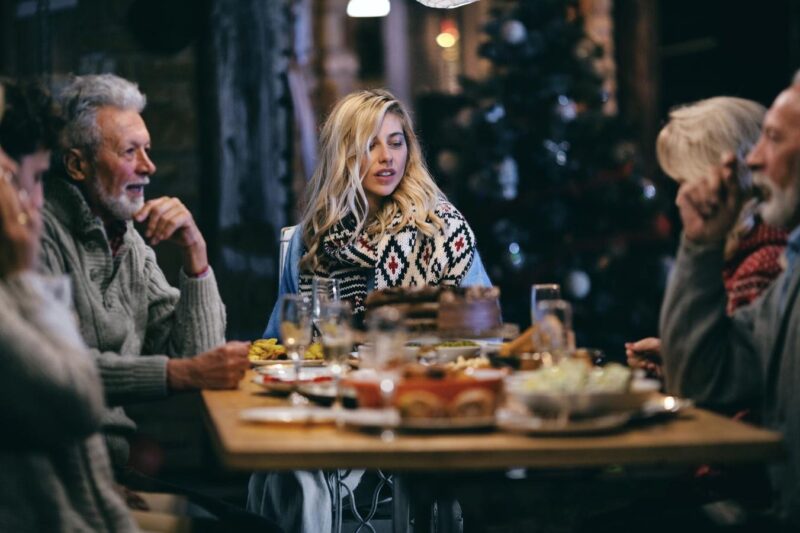If you tolerate behavior from relatives you would never accept from anyone else, it may be a sign that your ‘holiday personality’ has taken over.
getty
The holidays have a curious way of pulling us back in time. You can spend years building boundaries, developing your emotional intelligence and learning to advocate for yourself, but the moment you return to your family of origin, old patterns often reemerge. And before you know it, you’ve turned into your people-pleasing, boundary-less and over-functioning “holiday personality.”
You may notice yourself tolerating behavior you would never accept from friends or coworkers, suppressing your needs or over-accommodating others. While their sudden emergence may concern you, these reactions are not signs of weakness or low standards. They are often survival strategies learned in childhood that reactivate in familiar family contexts.
The root of the yearly shift lies in our early family dynamics, and the long-lasting imprint they leave on our emotional regulation system, our stress responses and interpersonal behavior patterns. Even as adults, our nervous system can revert to old coping strategies when we encounter the relational cues we experienced as children.
1. You Resort To A ‘Fawn Response’ During Holiday Season
The human brain relies on associative learning. It remembers environments, voices, gestures and interactions, and creates automatic responses to reduce cognitive effort over time.
For someone raised in a high-conflict or emotionally unpredictable household, a sarcastic remark from a sibling or a dismissive comment from a parent can trigger the same physiological response in them as an adult as it did during their childhood. This could look like an elevated heart rate, heightened vigilance and a drive to appease or withdraw.
Studies on stress and trauma show that familiar cues can activate learned survival responses, even decades later. So, when your nervous system perceives a relational threat, you may unconsciously tolerate behavior that would normally feel unacceptable, the same way that you did as a child.
This pattern of rolling over, tolerating or even trying to appease as a response to unacceptable behavior has been termed as the fawn response. Fawning involves placating, accommodating or over-functioning to prevent conflict and maintain connection. Returning home for the holidays can reactivate this response, leading you to say “yes” to obligations you do not want, suppress opinions to avoid confrontation, prioritize others’ comfort over your own or feel responsible for everyone else’s emotional state.
The important thing to remember here is that this isn’t a sign of poor judgment or weak character. It is merely an adaptive response that developed because, as a child, maintaining harmony often equaled safety.
2. You Revert To Old Family Roles During Holiday Season
Family systems theory highlights that families operate like ecosystems, with each member performing a role that persists over time. Returning home can pull you back into identities you thought you had left behind and worked hard to overwrite.
You may witness yourself become, once again, the quiet one who feels silenced, the responsible one who over-functions or the peacemaker who absorbs tension instead of asserting needs.
It may be different to make the distinction at first, but these behaviors are not regressions; they’re reenactments of relational dynamics that were necessary for emotional survival as a child. Understanding this can shift your perception from self-criticism to compassionate awareness.
3. Your Boundaries Become More Porous During Holiday Season
Growing up in volatile or unpredictable households heightens threat sensitivity, as confirmed by a recent review published in Development and Psychopathology. For many, conflict feels overwhelming or unsafe, and the body’s default is to minimize or avoid it.
During family gatherings, this heightened sensitivity can manifest as staying quiet when someone crosses a boundary, letting others’ behaviors slide rather than asserting needs or avoiding confrontation at the cost of your own comfort. The brain, in these moments, prioritizes emotional survival over assertiveness. This pattern intensifies during the holidays, when expectations, traditions and long-standing family dynamics converge.
Sometimes, we let others violate our boundaries, even when there is no threat, real or imagined, of conflict or volatility. Sometimes, it’s guilt that keeps us accommodating, even when it isn’t necessary.
Adults raised in obligation-focused or collectivist households often internalize the belief that putting themselves first is selfish. Healthy boundary-setting can trigger discomfort, even when appropriate.
During holiday gatherings, saying “no” to a family dinner may feel like betrayal, taking space to rest may feel like letting someone down and speaking up may trigger internalized rules about loyalty or obedience. Recognizing that guilt is a conditioned response, not a moral failing, allows you to make choices that honor both your history and your adult identity.
Breaking The Cycle Without Derailing Holiday Season
Changing automatic responses does not always require dramatic confrontations. Here are a few strategies that are practical and emotionally sustainable:
- Name the pattern instead of blaming yourself. Acknowledge when you slip into old roles by reminding yourself that your behavior is a survival response from your past and that you can choose differently now. Awareness interrupts the automatic loop and allows conscious decision-making.
- Set boundaries with behavior, not just words. Small adjustments can make a big difference. Step outside for a brief break, change the topic when conversations escalate or leave early if tension builds. These actions reinforce agency without escalating conflict.
- Pre-plan for triggers. Anticipate potential stressors, such as a critical relative, and prepare neutral, consistent responses for when they inevitably trigger you. Having these ready reduces emotional reactivity and maintains your sense of control.
Feeling like your “holiday personality” resurface around your family does not mean you have not grown, it means your early survival strategies are reactivating to protect you. These patterns are ingrained in your nervous system and often unconscious. Recognizing them, setting boundaries and practicing self-compassion allows you to navigate holiday gatherings with both grace and agency.
Do you struggle to be yourself in front of your family during the holiday season? Take this science-backed test to find the root of the problem: Authenticity in Relationships Scale









